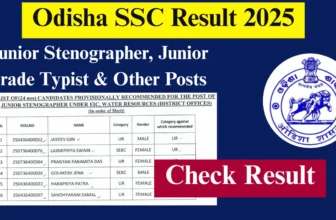8th Pay Commission 2025. The Union Cabinet has taken a major step forward for millions of central government employees by approving the Terms of Reference (ToR) for the 8th Central Pay Commission (CPC).
The decision marks the beginning of the process that will lead to a revision in salaries, allowances, and pensions for around 1.2 crore central government employees and pensioners.
“This is a significant step that impacts millions of families. The 8th Pay Commission will ensure fair compensation while balancing fiscal discipline,” — Union Minister Ashwini Vaishnaw, during the Cabinet press briefing.
Overview Table: 8th Pay Commission 2025
| Particulars | Details |
| Commission Name | 8th Central Pay Commission (8th CPC) |
| Approval Authority | Union Cabinet, Government of India |
| Date of Cabinet Approval | October 28, 2025 |
| Constitution Date | January 2025 |
| Chairperson | Justice Ranjana Prakash Desai (Former Supreme Court Judge) |
| Part-time Member | Professor Pulak Ghosh, IIM Bangalore |
| Member-Secretary | Petroleum Secretary Pankaj Jain |
| Official Website | https://www.pib.gov.in |
Understanding the 8th Pay Commission
The 8th Central Pay Commission (CPC) is responsible for reviewing and recommending changes in the pay structure, retirement benefits, and allowances for central government employees. These recommendations have a far-reaching impact not only on the workforce but also on the overall economy, as they influence the pay structure of state government employees and public sector undertakings.
Formed in January 2025, the Commission will have 18 months to finalize its report. The recommendations are expected to come into effect with retrospective benefits, ensuring that employees receive arrears from the date of its constitution.
The Commission’s primary objective is to ensure fair remuneration, keeping in view the economic conditions, fiscal responsibility, and comparative salary structures in public and private sectors.
Members of the 8th Pay Commission
The Commission will have three members who bring legal, academic, and administrative expertise:
- Justice Ranjana Prakash Desai – Chairperson and former Supreme Court Judge, known for her extensive experience in judicial reforms.
- Professor Pulak Ghosh – A part-time member and data scientist from the Indian Institute of Management (IIM) Bangalore.
- Pankaj Jain – Petroleum Secretary, serving as the Member-Secretary, ensuring administrative coordination and report implementation.
Their collective experience is expected to ensure a balanced and practical approach to recommendations that impact both employees and the nation’s fiscal health.
Expected Salary Hike and Fitment Factor
While the government has not released official figures, early projections indicate that the fitment factor could rise to 2.86, up from 2.57 in the 7th Pay Commission.
| Pay Commission | Year of Implementation | Fitment Factor | Minimum Basic Pay (₹) |
| 6th CPC | 2006 | 1.86 | 7,000 |
| 7th CPC | 2016 | 2.57 | 18,000 |
| 8th CPC (Expected) | 2026 (Approx.) | 2.86 (Projected) | Up to 37,000 (Estimated) |
If the projected fitment factor of 2.86 is adopted, the average salary increase could be up to ₹19,000 per month for many employees. This will significantly improve purchasing power and boost consumption, potentially stimulating economic growth.
Key Considerations for the 8th CPC
The Terms of Reference direct the Commission to assess multiple aspects before finalizing its recommendations. These include:
- Economic conditions and fiscal prudence of the country.
- Impact on state finances and coordination with state pay structures.
- The unfunded liabilities of non-contributory pension schemes.
- Resource availability for development and welfare programs.
- Comparison with pay and working conditions in public sector undertakings and private industries.
Additionally, the 8th CPC may submit interim reports on specific issues, allowing the government to implement certain recommendations earlier if necessary.
Impact on Central Government Employees and Pensioners
The 8th Pay Commission will directly benefit:
- Around 50 lakh active central government employees.
- Nearly 70 lakh pensioners and family pensioners.
Besides increasing basic pay, the recommendations will also revise Dearness Allowance (DA), House Rent Allowance (HRA), Travel Allowance (TA), and pension slabs.
The revision will likely come into force in mid-2026, though the benefits could be made retrospective from January 2025, resulting in a significant arrear payout.
Economic Significance
Pay Commissions play a dual role — ensuring employee welfare and maintaining fiscal balance. A fair pay structure motivates employees, reduces attrition, and enhances productivity across departments such as Defence, Railways, and Home Affairs, which have the largest workforce.
At the same time, the government must ensure that wage revisions do not create excessive fiscal pressure, keeping in mind the goal of long-term economic stability.
Looking Ahead
The 8th CPC recommendations are eagerly awaited as they are expected to bring much-needed relief amid rising inflation and living costs. By balancing employee welfare with fiscal prudence, the Commission’s report could play a pivotal role in shaping India’s public administration landscape for the next decade.
The formation of the 8th Pay Commission 2025 highlights the government’s commitment to maintaining transparency, fairness, and timely wage reforms for its workforce.
FAQs on 8th Pay Commission 2025
What is the 8th Pay Commission?
It’s a panel that reviews and recommends salary and pension revisions for central government employees.
When was the 8th Pay Commission approved?
The Union Cabinet approved its Terms of Reference on October 28, 2025.
Who is the chairperson of the 8th CPC?
Justice Ranjana Prakash Desai, former Supreme Court judge.
When will the recommendations be released?
Within 18 months of its constitution, i.e., by mid-2026
What salary hike is expected?
A projected fitment factor of 2.86 could result in salary increases of up to ₹19,000 per month.






